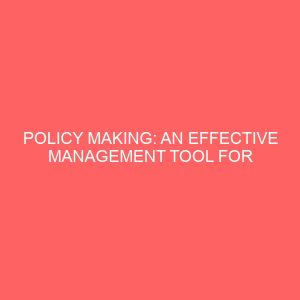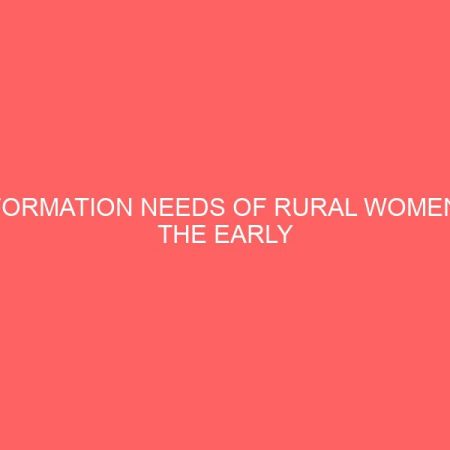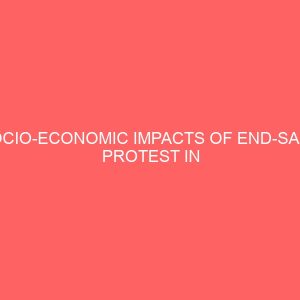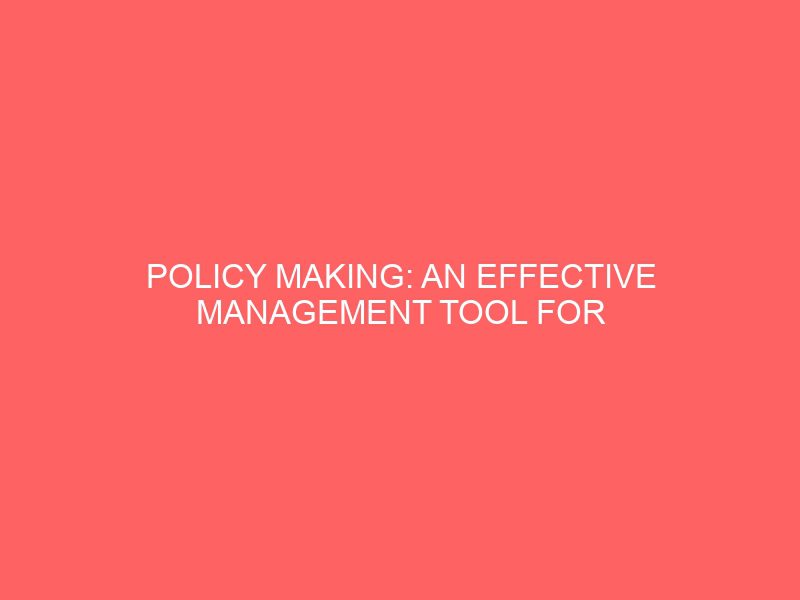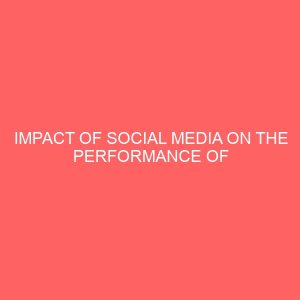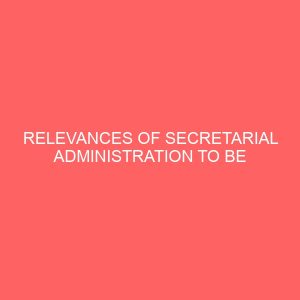Description
CHAPTER ONE
1.0 Introduction
The task of achieving the aims of an organization is one that has for many years remained a hard not to crack by the management of most organization, and as such left most of the organization either dead or stagnate.
The needs for policy making arise due to the nature of business firm that operates in this era. A firm which has originally commenced operations in a single product line catering for a unique set of customer in a limited geographical area, expanded in one or more dimension. Informal control and co-ordinations became partially irrelevant as expansion took place and the need for integrate functional areas arose. This integration functional area arose. This integration brings about framing of policies to guide managerial action. Policymaking became the prime responsibility for effective management system.
The implementation phases in strategic management process consist of a set of activities by which the top management assures that the strategic choice is communicated and related to both the organization and its people. This is to say that implementation encompasses the activity of developing the organizational structure and climate best suited for the implementation of the chosen or adopted policy.
1.1 Background to the Study
Over the years, worker unrest and agitations has rocked many organizations the world over and non-involvement of employees in the policy-making process has accounted for many of these.
Policy-making in organizations has been the preserve of top management without the involvement of those on the lower rungs of the ladder of management, yet they are the very ones expected to see to the implementation of these decisions.
The non-involvement of lower level management in policy/decision-making also means that vital input from employees is often not factored into decisions made. This gives rise to the problems that are experienced in organizations when it comes to the acceptance of these decisions and its implementation because employees feel slighted and of no importance because their views were not sought.
They also do not feel as being part of the decision process but rather, decisions are taken and ?pushed down their throats?. This leads to resistance to compliance or a lackadaisical attitude to implementation.
1.2 Statement of Problem
The management of most organizations in the world today has been facing the problem of not knowing how they could achieve the aims and objectives of their organization in the face of the changing world, so that their organization will survive and grow.
This problem which has defile many management approaches is what the researcher is aimed at solving.
1.3 Purpose of the Study
The purpose of the research problem include to following:-
1. To ascertain the effect of the policy and its implementation on organization performance.
2. To bring out the relationship between policy and its implementation on efficient management system.
3. To determine the nature of problem militating against effective policy and its implementation in achieving organizational aims (goals).
4. To make useful recommendation based on the findings of the study.
1.4 Objective of the Study
The objective of this study by the researcher is:-
i. To find out the important role of policy making and implementation plays in achieving an organizational objective.
ii. To improve the mental ability of the managers and enable them to link theory with practical such ability is important in making policy where large numbers of factors have to be considered.
1.5 Research Hypothesis
Ho: The efficient management system does not depend on policy making and implementation for attainment of organizational objective,
Hi: The efficient management system depends on policymaking and implementation for attainment of organizational objective.
Ho: Effective implementation does not contribute to an efficient management system.
Hi: In some organization, implementation of polices contribute immensely to an efficient management system.
1.6 Significance of the Study
The importance of policymaking cannot be over-emphasized. It can be viewed in different context where it proves to be helpful.
1. This study will enable management student to know the process of policy making and the important roles it plays in achieving the objective of the organization.
2. This study will help in training of the future managers by showing how things should be done.
3. It will enable public policy makers to provide guidelines for the achievement of the objective of government and private establishment.
4. It will help managers to economies their time, since polices direct future action, managers do not engage in daily guiding of sub-ordinates.
5. It will enable the general readers to be acquainted with the process of making policies.
1.7 Scope of the Study
This study is limited to the topic ?policy making: A tool for an efficient management system to achieve the aims of an organization here is Nigeria Breweries plc, Ibadan.
1.8 Definition of Terms
They are the basic economic and social purposes for which an organization exists. They are also defined in an organization.
POLICY: A predetermined guide established to provide directions to decision making. A policy defined as area within which the decision can be made but it does not take the decisions.
EFFICIENT: The ability to achieve a result with minimum input.
MANAGEMENT: The efficient utilization of the human, material and financial resources of an organization to achieve the objective of an organization.
It can also be defined as body or group of person who see to the efficient utilization of the human, material and financial resources of an organization to achieve the objective of the organization.
ORGANIZATION: A business unit, set up to achieve objective.
POLICY MAKING: Is a purpose of developing an-effective policy?
POLICY CHOICE: Is a chosen policy from among the alternatives?
POLICY IMPLEMENTATION: The process of implementing a chosen policy.
TOOL: An instrument for achieving an objective.
ENVIRONMENTAL APPRAISAL: Is the process of examining the environment of an organization for the identification of opportunities and threats and strength and weakness?
EVALUATION: Is the process of examining the performance of policy in achieving a given or objective.
OBJECTIVES: They are the basic economic and social purpose for which an organization exists. They are also defends the ends an organization seeks to achieve.
EFFICIENT: It is the ability to achieve a result with minimum input.
Management: It is the efficient utilization of the human, material and financial resources of an organization to achieve the objective of the organization.

